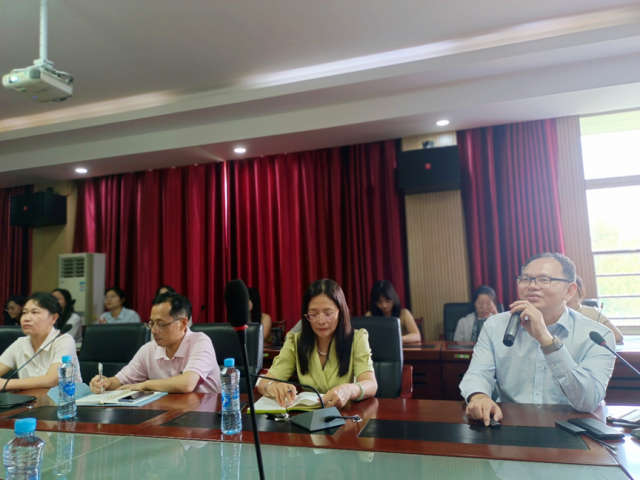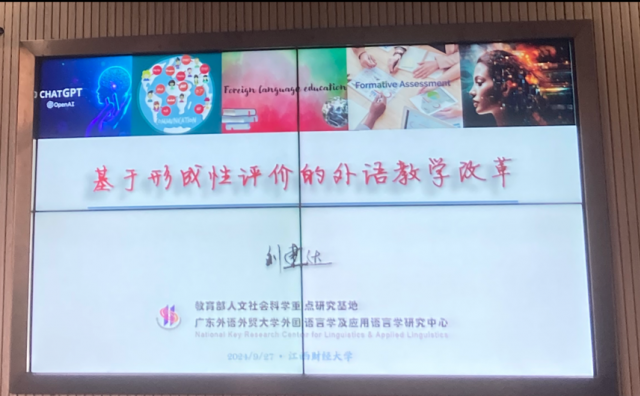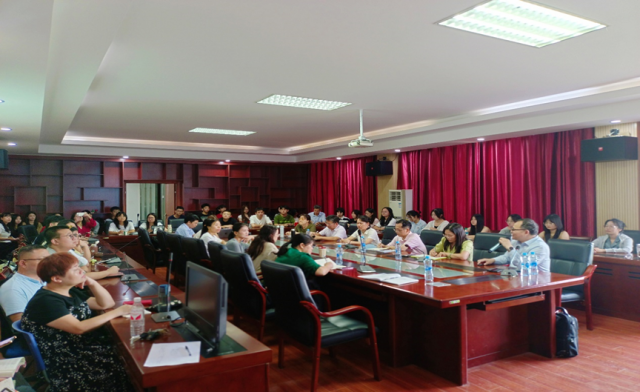On the morning of September 27, 2024, teachers and students from the School of Foreign Languages (SFL) gathered to attend a captivating lecture titled Foreign Language Teaching Reform Based on Formative Assessment. The esteemed keynote speaker was Professor Liu Jianda, Vice President of Guangdong University of Foreign Studies, honored as a recipient of the Program for New Century Excellent Talents in University by the Ministry of Education, and a respected doctoral supervisor. Deputy Dean Du Jingping presided over the event, which garnered widespread acclaim and enthusiastic participation.

Professor Liu commenced his address by delving into the macro backgrounds of significance of education, the imperatives for new quality productive forces, and the swift progression of artificial intelligence. He underscored that foreign language education has embarked on a new era, bringing forth substantial impacts and challenges that necessitate novel demands on the field. Professor Liu then conducted a thorough analysis, imparting his experiences and perspectives on pivotal matters, such as the development of new quality productive forces within foreign language disciplines and the establishment of an independent foreign language teaching system in China. He emphasized three standards for new quality productive forces: high technology, high quality, and high efficiency, urging educators to devise methods for their attainment in foreign language education. With the relentless advancement of artificial intelligence technology, traditional human translation has been profoundly affected, leading to shifts in foreign language teaching methodologies and content. Professor Liu stressed the need for continuous new-quality development in foreign language education, guided by high technology in the form of artificial intelligence integrated with foreign languages, centered on students, innovating teaching models to foster high-efficiency cultivation, and achieving high-quality development through communicative language proficiency, international communication capacity, and the ability to serve the Four News (a reference to new technologies, industries, business models, and infrastructure).

Professor Liu further elaborated on the new-quality development of foreign language education in the new era from six facets, encompassing innovative educational philosophies, teaching method reforms, and evaluation system improvements. He placed particular emphasis on formative assessment, elucidating the reform philosophy and implementation pathway for foreign language teaching methodologies. Professor Liu advocated for an educational philosophy oriented towards cultivating high-quality inter-disciplinary foreign language talents to serve the establishment of new liberal arts disciplines. Consequently, foreign language education must update its teaching content and reform its methods, necessitating teachers and students to redefine their roles and responsibilities. Teachers, he suggested, should assume the role of an orchestra conductor, placing students at the center of the classroom and guiding them towards self-paced and collaborative learning, thereby facilitating foreign language digital education rooted in formative assessment. Subsequently, Professor Liu underscored the importance of teaching based on the concept of formative assessment, encompassing its connotation, teaching objectives, five formative assessment strategies, learning through electronic portfolios, the advancement of foreign language digital education, and foreign language textbooks. Using the college English formative assessment teaching at Guangdong University of Foreign Studies as an illustrative example, he provided an in-depth account of this teaching concept's application in practice. Ultimately, Professor Liu emphasized that the key to the development of foreign language disciplines lies in the hands of teachers, who must adapt to the new era's requirements under the guidance of the educator's spirit, enhance their discipline capabilities and qualities, and fulfill the objective of cultivating inter-disciplinary foreign language talents.

Following the lecture, teachers and students engaged in spirited discussions with Professor Liu, exploring the objectivity and classroom operability of formative assessment, as well as the integration of ideological and political content within the curriculum. At the lecture's conclusion, Deputy Dean Du Jingping summarized the main points, and teachers and students expressed their sincere gratitude to Professor Liu with warm applause, acknowledging the profound insights they had gained and the subsequent reflection and exploration inspired in their approach to foreign language education and learning. By Gao Peng and Du Jingping
|